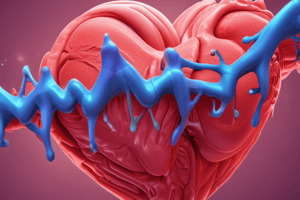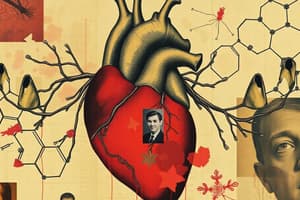Podcast
Questions and Answers
What is the primary effect of cardiac glycosides on the heart?
What is the primary effect of cardiac glycosides on the heart?
- Improved myocardial contraction and atrioventricular conduction (correct)
- Increased heart rate
- Decreased cardiac output
- Reduced blood pressure
What is the physical property of cardiac glycosides?
What is the physical property of cardiac glycosides?
- Pungent smell
- Amorphous powders (correct)
- Crystalline powders
- Soluble in organic solvents
What is the effect of elevated temperature on cardiac glycosides?
What is the effect of elevated temperature on cardiac glycosides?
- Increased solubility in water
- Decreased toxicity
- Hydrolysis of the glycosidic bond
- Dehydration of the –OH at C14 with the production of an inactive anhydro-form (correct)
What are the two types of genin distinguished in cardiac glycosides?
What are the two types of genin distinguished in cardiac glycosides?
What is the unique feature of deoxy-sugars associated with cardiac glycosides?
What is the unique feature of deoxy-sugars associated with cardiac glycosides?
What is the bond formed between the sugar moiety and the steroid nucleus in cardiac glycosides?
What is the bond formed between the sugar moiety and the steroid nucleus in cardiac glycosides?
What is the effect of cardiac glycosides in large doses?
What is the effect of cardiac glycosides in large doses?
What is the importance of cardiac glycosides in medicine?
What is the importance of cardiac glycosides in medicine?
What is the diuretic activity of cardiac glycosides related to?
What is the diuretic activity of cardiac glycosides related to?
What is the significance of deoxy-sugars in phytochemical testing?
What is the significance of deoxy-sugars in phytochemical testing?
Flashcards are hidden until you start studying
Study Notes
Cardiac Glycosides
- Cardiac glycosides are plant sterol derivatives that affect myocardial contraction and atrioventricular conduction.
- They can be toxic in large doses, causing cardiac arrest in systole, but are important drugs in the treatment of congestive heart failure in lower doses.
- They have a diuretic activity, which improves circulation and relieves edema often associated with heart failure.
Properties of Cardiotonic Glycosides
- General properties:
- Amorphous powders
- Soluble in water
- Bitter in taste
- Insoluble in organic solvents
- Odourless compounds
- Generally toxic compounds
- Physical and chemical properties:
- Soluble in H2O and EtOH
- Aglycones are soluble in organic solvents
- Increase in glycosides increases solubility
- Enzyme & acid hydrolysis
- Elevated temperature results in dehydration of the –OH at C14 with the production of an inactive anhydro-form
Cardiotonic Scaffold
- Two types of genin can be distinguished:
- Five-membered lactone ring (cardenolides)
- Six-membered lactone ring (bufanolides/bufadienolides)
- Sugar moieties are attached by a C3,β-linkage and composed of up to four sugar units, including glucose, rhamnose, and other deoxy-sugars.
Structural Diversity and Structure-Activity Relationship
- Naturally occurring deoxy-sugars (except rhamnose) are unique to cardiac glycosides and relevant to phytochemical testing.
- Deoxy sugars associated with cardiac glycosides include:
- 6-deoxy hexose (methyl pentose): rhamnose, fucose, allomethylose
- Methyl pentose-3-methyl-ether: digitalose
- 2,6-deoxy hexose: digitoxose, boivinose
- 2,6-deoxy hexose-3-methyl-ether: cymarose, sarmentose, oleandrose
- Cardioactivity is due to aglycone moiety, while pharmacokinetic behavior is influenced by glycone moiety.
- The α,β-unsaturated lactone ring is responsible for activity, but saturation decreases potency by 10-fold, and opening results in complete loss of activity.
- The cis junction of rings C/D and A/B is necessary for activity, with A/B cis fused rings being more potent than A/B trans.
Studying That Suits You
Use AI to generate personalized quizzes and flashcards to suit your learning preferences.




